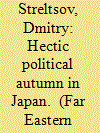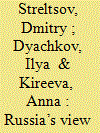| Srl | Item |
| 1 |
ID:
184035


|
|
|
|
|
| Summary/Abstract |
Autumn 2021 was hectic for Japanese politics. Elections of new representatives of the Japanese Parliament and anew President of the Liberal Democratic Party (LDP) were to be held. The situation was aggravated by the COVID-19 epidemic and, in connection with that, the declining ratings of the governing party and Prime Minister Yoshihide Suga, which fell to critically low levels. To improve the situation, the LDP had to take extraordinary steps, such as electing a new national leader, changing the party's leadership, setting up a new government, and holding off-year elections to the lower parliamentary chamber on October 31, with new political ideas and fresh faces in the party's leadership.
|
|
|
|
|
|
|
|
|
|
|
|
|
|
|
|
| 2 |
ID:
147020


|
|
|
|
|
| Summary/Abstract |
This article deals with the new military security policy of Japan after the return of the Liberal Democratic party to power in 2012. The author examines basic conceptual documents of Japan's strategy in this sphere. The analysis shows that Tokyo's course reflects a deviation from the traditional understanding of pacifism as the denial of the state's right to wage war.
|
|
|
|
|
|
|
|
|
|
|
|
|
|
|
|
| 3 |
ID:
157761


|
|
|
|
|
| Summary/Abstract |
The article focuses on Russia’s approach to international security in Northeast Asia.
It argues that Russia’s unique position is that it is not a party of any major security–
political conflict, takes a neutral position on territorial conflicts as best suiting its
interests of promoting cooperation with all East Asian states and objects to the
involvement of third parties. Russia is involved only in a dispute with Japan where
it demonstrates a flexible position. As a comparatively weak regional player, Russia
is interested in maintaining peace, stability and the status quo, in particular on the
Korean Peninsula, and has no revisionist agenda in East Asia. Major elements of
Russia’s approach include creating an inclusive, open, transparent and equitable
regional security architecture, support for polycentric regional order with Russia
as one of the major centers of power, criticism of the U.S.–sponsored MBD as
well as focus on a strategic partnership with China. Intensifying its Asian pivot,
Moscow is increasingly concerned with the tensions on the Korean Peninsula
where it promotes denuclearization, dialogue between the two Koreas, resumption
of the Six–Party Talks and opposes to the dangerous actions of all parties. Russia
and China advocate a “moratorium for a moratorium” proposal as the only way to
mitigate tensions and create a common security mechanism.
|
|
|
|
|
|
|
|
|
|
|
|
|
|
|
|